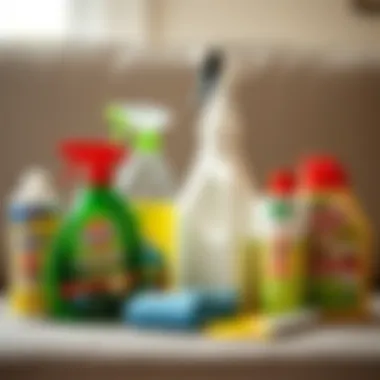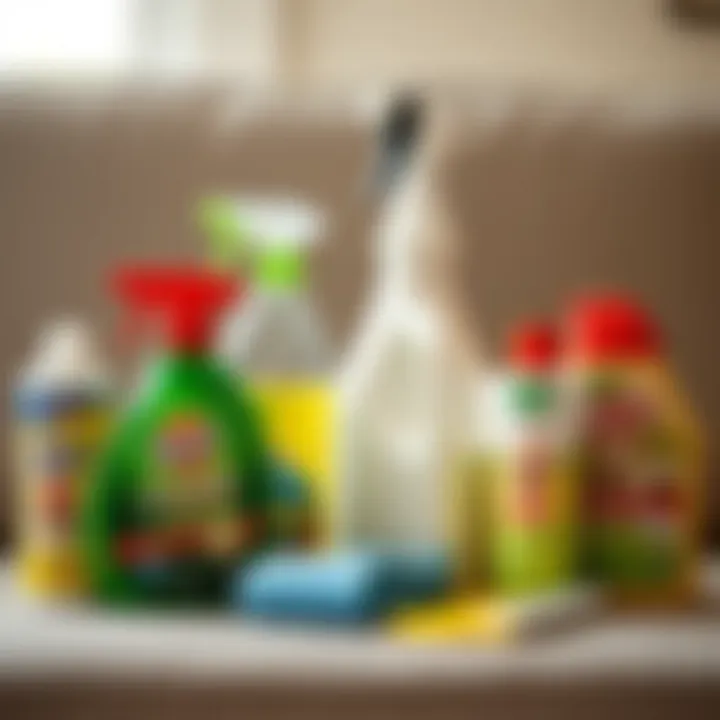Effective Strategies for a Fresh Couch with Dogs


Intro
Sharing your home with a dog can undoubtedly bring moments of joy and chaos, but it also presents unique challenges, particularly when it comes to maintaining a clean and fresh-smelling couch. The truth is, canine companions are known for their energetic nature, which often translates to odors that can cling stubbornly to furniture. This article will provide a detailed guide on how to keep your living space, especially your couch, free from unpleasant scents stemming from your furry friend.
From practical cleaning techniques to preventive measures, we will explore various strategies that cater to the needs of pet owners. The aim is to help create an environment that remains both inviting and hygienic, allowing you and your pet to enjoy your space without the constant worry of odors. So, if you’re ready to transform your couch into a fresh oasis amidst canine companionship, let’s dive into the essentials.
Pet Care and Grooming
Importance of Regular Care
Regular grooming and care play a pivotal role in maintaining not only your dog’s health but also the cleanliness of your home. The simple act of brushing your dog's coat helps remove loose fur and dander, which are primary contributors to couch odors. With just a few minutes of your time, you can significantly reduce the buildup of these irritants.
Grooming Techniques by Pet Type
Different breeds call for divergent grooming practices. For example, long-haired breeds like Golden Retrievers need routine brushing a couple of times a week to prevent matting. Short-haired dogs, such as Beagles, may require less frequent grooming but can still benefit from regular brushing to eliminate dirt and allergens.
Tools and Products Recommendations
Here are some essential grooming tools that can prove invaluable:
- Slicker Brushes: Perfect for removing tangles from long-haired dogs.
- Rubber Grooming Mitts: Work wonders for short-haired breeds while also giving a nice massage.
- Lint Rollers: Handy for picking up stray dog fur from couches in between deeper cleanings.
Seasonal Care Tips
Each season presents its challenges. For instance, during shedding seasons—spring and autumn—it becomes crucial to ramp up grooming efforts. Regular baths with soap-free, hypoallergenic shampoos can further mitigate odors. Also, a good air purifier can catch airborne allergens, keeping the environment fresh.
Health and Nutrition
Understanding Pet Nutrition
What goes into your dog can have a massive impact on how they smell. High-quality dog food often leads to healthier coats and less smelly skin. If your dog suffers from skin issues, it may be worth consulting your vet about their diet.
Common Health Issues by Species
Be alert to common health issues like allergies and skin infections that can lead to unpleasant odors. If you notice an unusual smell, it could signify underlying health problems that require veterinary care. Regular check-ups are key.
Preventive Care and Regular Check-Ups
Routine check-ups with a veterinarian can identify potential health concerns before they escalate. Ensure vaccinations are up to date and schedule dental cleanings, as oral issues can also contribute to foul smells.
Food and Dietary Advice
Consider switching to a grain-free or hypoallergenic dog food if your dog consistently smells bad or has frequent skin issues. This type of diet often helps in keeping your furry friends fresher.
Behavioral Training
Basics of Positive Reinforcement
Teaching your dog good behavior, including where to lounge or rest, can directly impact the cleanliness of your couch. Utilize positive reinforcement to encourage desirable behaviors. Instead of scolding them for jumping on the couch, reward them with a treat when they settle down on their designated spot.
Training Techniques Users Can Apply
A few effective training methods include:
- Clicker Training: Helps teach commands and good habits clearly and effectively.
- Boundary Training: Establish specific areas in your home where your dog can or cannot go.
- Consistent Commands: Always use the same word or phrase when directing behaviors.
Managing Behavioral Issues
If your dog tends to chew or scratch furniture, it might be time to redirect their energy. Providing alternatives like chew toys or interactive puzzles can curb destructive behavior, keeping both your couch and your pet safe.
Importance of Socialization
Socializing your dog with other pets and environments not only improves their behavior but can aid in preventing issues that might lead to couch odors. Positive experiences in new settings help in the development of a well-rounded pet.
Engaging Activities and Enrichment
Fun Games to Play with Your Pet
Keeping your dog entertained can reduce the likelihood of mishaps on the sofa. Engage them with games like fetch, tug-of-war, or hide-and-seek. These interactive activities can burn off some of that excess energy.
DIY Toys and Activities


Consider turning household items into stimulating toys. A rolled-up towel can create a tugging situation, and empty plastic bottles can become chew toys—just ensure to monitor them while they play.
Importance of Mental Stimulation
Like people, dogs need mental exercise. Puzzles that hide treats inside encourage problem-solving skills and can keep them distracted from the couch.
Outdoor Adventures and Exploration
Take your pup on regular walks or hikes to keep them physically fit while avoiding couch lounging. Exploring different terrains can provide new sights and smells, which can keep your dog content.
Resources and Community Engagement
Recommended Books and Websites
There are numerous books and online resources dedicated to pet care, such as The Whole Pet Diet by Andi Brown and websites like American Kennel Club (www.akc.org) which offer a trove of information.
Forums and Groups for Pet Owners
Join online communities like Reddit (reddit.com) to share experiences, tips, and tricks with other pet owners. Engaging with fellow dog parents can provide invaluable insights.
Finding Local Services and Classes
Look up local pet training services or interactive doggy playgroups. These can not only benefit your dog's behavior but also contribute to a cleaner home environment.
Encouraging Community Sharing and Contributions
Consider sharing your own experiences and tips on platforms like Facebook (facebook.com). This not only fosters community but also helps other pet owners who might be struggling with similar issues.
By following these practical strategies and engaging in a consistent care routine, your couch can remain fresh and inviting. After all, a happy home is one where both pets and their humans can coexist without battling unpleasant odors.
Understanding the Source of Odors
When it comes to keeping our couches smelling fresh in the presence of our beloved dogs, understanding the source of odors is paramount. Many dog owners experience challenges in maintaining a pleasant home environment due to the unique aroma that comes with canine companionship. Knowing why these odors occur not only helps in combating them but also allows for more effective cleaning strategies. Familiarity with the cause can guide you in choosing the right methods and products to mitigate those pesky smells.
Common Causes of Dog Odors
Dog odors stem from various sources, each contributing to that telltale scent that may permeate your living space.
- Skin and Coat: Dogs have natural oils in their skin that can trap dirt, bacteria, and moisture. When these oils build up over time, they can produce a foul smell.
- Saliva: Dogs often drool or lick their fur, especially while eating or playing. This saliva can mix with dust and dirt, causing further odor issues.
- Urine and Feces: Accidents, whether indoors or outside, leave lingering odors that can seep into couch materials. Even house-trained dogs can have slip-ups, which can be problematic if not addressed promptly.
- Diet: Sometimes the food dogs eat can affect their body odor. Lower-quality diets or specific ingredients may lead them to emit a stronger scent.
- Environmental Factors: Muddy paws after a walk or rolling in something unpleasant outside can contribute to couch smells.
How Dog Habits Contribute to Couch Smells
Once you grasp the common causes of odors, it becomes clear how dog habits can exacerbate these issues. Here’s a breakdown of their daily activities that tie into couch smelly situations:
- Couch Sleeping: Dogs love to snuggle on the couch, especially if it’s their favorite spot. That often means any dirt or dander they carry gets transferred to the fabric.
- Licking and Scratching: Dogs don’t always keep themselves tidy. Their licking and scratching habits can lead to a buildup of saliva, fur, and dead skin cells on the fabric.
- Playtime: Play is essential for dogs but it can lead to mess. Toys often get slobbery and dirty, which can transfer smells onto the couch.
- General Activity: From running around to playing with other pets, dogs can bring in all sorts of outdoor elements, like soil or leaves, that contribute to couch odors.
Key Insight: Prevention is often more effective than cleaning. Being vigilant about your dog's hygiene, along with regular couch maintenance, can dramatically reduce unpleasant odors.
In summary, understanding the origins of couch smells allows pet owners to adopt a proactive approach. By recognizing the common causes and daily habits that lead to those unwanted scents, one can implement effective strategies tailored to combating odors and maintaining a fresh-smelling environment.
Regular Cleaning Routines
Maintaining a fresh-smelling couch in a home shared with dogs isn’t just a matter of aesthetics; it’s also a health concern. Regular cleaning routines act as the foundation in the never-ending battle against pet odors and the germs that accompany them. By implementing consistent cleaning habits, pet owners can stay one step ahead of the smell that often lingers long after the fur settles. Not only does this boost the comfort level of your living space, but it can also minimize health risks associated with pet dander and bacteria.
Most importantly, a well-planned cleaning schedule allows pet owners to intervene before the couch becomes overly saturated with odors. A five-minute daily vacuum can prevent the buildup of fur and associated smells, while deeper cleaning methods scheduled once a month can ensure that the fibers of your sofa are free from any trapped particles. Households with pets can significantly benefit from setting up a regular routine, thereby creating a cleaner and fresher living environment.
Vacuuming Techniques for Pet Owners
When it comes to vacuuming, the right technique can make all the difference. Simple vacuuming isn’t enough; pet owners must adapt their methods to tackle stubborn hair and odors. Investing in a vacuum designed specifically for pet owners can make the chore less daunting. These vacuums often come equipped with powerful suction and specialized attachments made for tackling pet hair on upholstery.
- Use a vacuum with a HEPA filter. This type captures microscopic particles effectively and helps improve air quality in your home.
- Pay attention to edges and crevices. Many pets love to make themselves comfortable in the most unapproachable corners of your couch.
- Make use of upholstery attachments designed for grabbing hair from fabric surfaces and use a lint roller for quick touch-ups after vacuuming.
Fabric-Specific Cleaning Methods
Every couch material has its own quirks and should be cleaned accordingly. Whether it’s leather or fabric, knowing how to clean effectively based on the couch's material is key to maintaining its appearance and smell.
- Leather: Leather couches require specialized care. A damp cloth can remove surface debris, and a pH-balanced cleaner can help maintain leather's suppleness. Regular conditioning can also prevent cracks and odors from becoming trapped.
- Microfiber: This fabric, beloved by pet owners for its stain resistance, can be tackled with a mixture of equal parts vinegar and water. It can lift both dirt and odors when spritzed lightly and wiped down with a soft cloth.
- Upholstery: For regular fabric, consider using a steam cleaner periodically to dive deep into the fibers, effectively flushing out any stuck odors and germs.
Using Pet Odor Neutralizers Effectively
Even after regular cleaning, unpleasant odors can still linger. Utilizing an odor neutralizer can tip the scales back in your favor. Here are a few strategies to maximize their effectiveness:
- Choose enzyme-based products, as they work by breaking down the molecules that cause odors, instead of just masking them with scent.
- Test for Fabric Compatibility: Always do a patch test on hidden areas to ensure the neutralizer will not alter the fabric’s color or texture.
- Use deodorizers specifically designed for pet odors. These products often contain unique blends that effectively tackle dog-related smells, making them a valuable addition to your cleaning arsenal.
- Lastly, don’t forget the importance of airflow. Ventilation can draw away stale odors while freshening up your living space. Open windows when cleaning or use fans to circulate air.


By committing to these regular cleaning routines, pet owners can effectively manage the odor issues that often accompany canine companionship, ensuring a pleasant space to relax and enjoy life with their furry friends.
Preventative Measures
Taking steps to prevent odors from settling into your couch is far more effective than trying to combat them after they arise. Preventative measures not only save you time and effort but can also prolong the lifespan of your furniture. By being proactive, you create an environment that minimizes the ability of pet odors to take hold.
Choosing the Right Couch Material
The first line of defense is the couch material you choose. Not all fabrics are created equal when it comes to withstanding the rigors of living with pets. Here are some materials that stand out:
- Leather: This material can offer a sleek, durable surface that's easy to wipe clean. Leather also doesn't harbor fur or dander as much as fabric, making it a fine choice for dog owners. However, it’s essential to maintain it with conditioning treatments to prevent cracks.
- Microfiber: A favorite among pet owners, microfiber is stain-resistant and can repel moisture to a degree. It has a soft texture that many pets find comfortable, providing a win-win situation.
- Denim: Surprisingly robust, denim withstands wear and tear while being easy to wash. The heavier weave can help minimize absorption of smells.
When selecting, be cautious with lighter colors, as they might show stains more easily. Darker shades tend to conceal mishaps better.
Establishing Dog-Free Zones
Creating areas in your home where dogs aren’t allowed can help keep your couch fresh. It may seem a bit restrictive, but setting boundaries can be a game changer. Here are some considerations for establishing dog-free zones:
- Use Baby Gates: These are great for controlling access to certain rooms or areas. Training your dog to understand these boundaries will take time but will pay off in the long run.
- Train Commands: Simple commands can encourage your dog to stay off the couch. Use commands like "off" or "stay" consistently. Positive reinforcement will help in this training process.
- Create an Alternative Space: Make sure your dog has a cozy spot just for them, such as a dog bed or blanket, preferably placed nearby to keep them connected while offering them their own space.
"Prevention is not just better than cure; it's a strategy to ensure that both your dog and furniture stay comfortable and fresh."
In sum, preventive strategies like choosing the right material and setting dog-free zones can significantly improve the freshness of your couch and your living space. It's about finding balance and ensuring your pets are happy while keeping your home comfortable.
Incorporating Deodorizers
When it comes to keeping your couch smelling fresh, deodorizers play a vital role in overall odor management. They are more than just a quick fix; they work to neutralize smells at their source, offering a more comprehensive solution. These agents can range from natural substances you might have on hand to specialized commercial products designed specifically for pet odors. Their ability to tackle unpleasant scents directly contributes to maintaining a welcoming environment in your home, enhancing not only the couch but the overall ambiance of your living space.
Natural Deodorizing Agents
Baking Soda
Baking soda is quite the powerhouse in the realm of deodorizers. It is well-known for its unique property of absorbing moisture and odors rather than just masking them. This characteristic makes it a stalwart choice when looking to combat the persistent dog odors that can creep into your furnishings. With its low cost and ease of use, all you typically need to do is sprinkle it generously on the couch and let it sit for at least fifteen minutes, then vacuum it away.
However, one should keep in mind that while baking soda is generally a safe option, excessive use might lead to residue build-up, which could become an additional annoyance. Additionally, its effectiveness can diminish in damp environments, necessitating more frequent applications. But for most casual applications, it remains a staple in many households.
Vinegar Solutions
Vinegar solutions offer another natural option that can help in the battle against couch odors. The acetic acid in vinegar works as a formidable deodorizer that effectively neutralizes unpleasant smells. To use, simply mix equal parts of water and white vinegar in a spray bottle and lightly mist the affected areas. It’s usually best to test a small inconspicuous area of your couch first to ensure that the material holds up against the vinegar.
What sets vinegar apart is its ability to penetrate fabrics, working to eliminate odors that may have become entrenched in the upholstery. However, there's a trade-off; while vinegar has strong deodorizing properties, its own scent can be quite potent and may linger for a short time. Nonetheless, this is often a small price to pay for the fresh smell that follows after the vinegar evaporates.
Essential Oils
Essential oils can bring a variety of benefits when used as deodorizers in your couch maintenance routine. They not only add a pleasant scent but also come with antimicrobial properties that can help reduce the presence of bacteria and dander. Popular choices for deodorizers include lavender, tea tree, and eucalyptus oils. Diluting a few drops in water and using a spray bottle allows you to freshen up the fabric without compromising its integrity.
One of the appealing aspects of essential oils is their versatility. You can create custom blends tailored to your preferences. However, a drawback might be the potential for allergic reactions in sensitive pets or individuals. It is crucial to conduct proper research to ensure that the essential oils you choose are safe for both pets and humans alike.
Commercial Products for Odor Control
When natural solutions do not cut it, myriad commercial products are specifically designed to tackle pet odors on the market. These products often contain enzymes or chemicals that break down odor-causing substances, providing a quick and effective solution. Some popular brands include Nature's Miracle and Rocco & Roxie, offering sprays and powders tailored to different materials and surfaces.
While these products may come with a higher cost, they provide the convenience and effectiveness that can be particularly beneficial in households with multiple pets. Nevertheless, it's essential to read labels carefully to ensure they are pet-friendly. Some products may contain harsh chemicals that are not ideal for a family environment.
Deep Cleaning Techniques
In the world of pet ownership, maintaining a fresh-smelling couch often feels like an uphill battle. Dogs, as much as we adore them, can be a source of unwelcome odors. Relying solely on daily vacuuming and surface cleaning won't cut it. Deep cleaning is an essential strategy for tackling ingrained dirt and persistent smells, ensuring your couch remains a welcoming part of your home.
The importance of deep cleaning lies not just in tackling surface-level grime, but also in eliminating bacteria and allergens that can accumulate in the fibers of your couch. This work helps to restore the integrity of the fabric and can prolong the lifespan of your furniture. When your favorite spot for movie marathons starts to get a bit too 'doggy,' it’s time to roll up your sleeves and dive into deep cleaning techniques.
Steam Cleaning for Fabric Couches
Steam cleaning is one of the most effective methods for refreshing a fabric couch. It penetrates deep into the fabric fibers, loosening dirt, dust mites, and pet dander. This method is not only powerful but also eco-friendly, requiring minimal use of chemicals. When steam cleaning, always read the manufacturer's instructions to ensure your couch can endure the heat and moisture involved.
- Preparation: Start by vacuuming your couch thoroughly. This step ensures loose dirt isn't embedded further during steaming.
- Equipment: Use a steam cleaner designed for home use, which is generally user-friendly. Fill it with distilled water, as this prevents mineral deposits from building up in the machine.
- Technique: Work in sections, moving slowly to allow the steam to do its job. Aim for corners and seams where odors often linger. After steaming, give the couch some time to dry completely before using it again to avoid mold growth.
Steam cleaning can work wonders. It not only deodorizes but also revives the colors of your upholstery, making it look almost new.
Shampooing Options for Various Materials
Different couch materials require tailored shampooing techniques to avoid damage. For instance, leather and microfiber respond well to specific types of cleaners, while others like cotton or linen can handle more intense cleaning products.


- Leather Couches: Always opt for a pH-balanced shampoo formulated for leather. Mix a small amount in water, dampen a cloth, and gently wipe the surface. Avoid soaking; leather can warp if too wet.
- Microfiber Couches: These often allow for a deeper clean. You can use a solvent-based cleaner, applying it with a soft brush to agitate and lift odors from the fibers. Rinse with a cloth (not too wet!) and allow to dry.
- Fabric Couches: Look for a water-based upholstery shampoo. The application should be even, and scrubbing should be gentle to avoid fabric fraying.
"Neglecting your couch's deep clean can leave lasting pet odors and allergens, impacting your home environment and comfort."
Ultimately, knowing the right techniques and products to use can make all the difference in maintaining the freshness of your couch. Regular deep cleaning helps ensure that, even with a dog by your side, your living space remains a pleasant sanctuary.
Involving Professional Services
Maintaining a fresh-smelling couch, especially when living with dogs, can be quite a challenge. While routine cleaning and preventative measures work wonders, sometimes, even the most diligent pet owners need to consider the expertise of professional cleaning services. Not only do these experts bring specialized equipment, but they also possess a depth of understanding regarding the nuances of various fabrics and odors that might not be readily apparent to the average homeowner.
Given the relentless nature of pet odors—be it stubborn dander, lingering wet dog smells, or the aftermath of an occasional accidents—it's not just about cosmetic appeal. A fresh-smelling environment can contribute significantly to the overall quality of life in your home, and that's where trained professionals can step in. They can offer services that go beyond what a vacuum or household product can achieve, potentially prolonging the life of your furniture.
"Sometimes, it's not just about cleaning, but about restoring an environment to a healthy state."
When to Hire a Cleaning Professional
Determining the right time to call in the pros can save both time and headaches in the long run. There are several key indicators that suggest it may be time to enlist professional help:
- New Pet Introduction: When you adopt a new furry friend, they might bring new odors into your home. A thorough deep clean can set a fresh baseline for your living space.
- Established Odors: If your cleaning efforts have resulted in temporary fixes but the smells keep making a comeback, it indicates a deeper issue. Professionals can identify and mitigate the source effectively.
- Allergy Sufferers at Home: If someone in your household has allergies, it's crucial to maintain a clean environment. Professional services can help eliminate allergens that vacuuming may not completely address.
- Time Constraints: Balancing a busy lifestyle with pet care can leave little room for comprehensive cleaning. Using a service provides a time-efficient solution when your schedule is packed.
Evaluating Cleaning Services Specializing in Pet Odors
Finding the right cleaning service tailored for pet owners isn't just about convenience; it's about effectiveness and reliability. Consider the following factors when assessing potential services:
- Experience and Expertise: Look for companies with a proven track record in dealing with pet odor removal. Questions to ask might include how long they’ve been in business and if they specifically handle pet-related issues.
- Methods and Products Used: Inquire about the cleaning methods and products utilized. Ideally, they should use eco-friendly, pet-safe solutions that effectively eliminate odors without compromising safety. Many professionals can provide details on their approach, so don’t hesitate to ask.
- Customer Reviews: Checking testimonials can give insight into other pet owners’ experiences. Reach out on forums like Reddit, or platforms like Yelp and Facebook to gather feedback.
- Guarantees Offered: Many reputable cleaning companies offer satisfaction guarantees. This not only showcases their confidence in their services but also provides peace of mind for you as a customer.
- Pricing Transparency: Ensure they offer clear pricing without hidden fees. Compare quotes, but do not solely base your decision on cost; consider the value offered as well.
In summary, involving professional cleaning services can be a significant asset when maintaining a fresh-smelling couch in a pet-friendly home. Knowing when to seek help and how to evaluate these services can make all the difference in creating a pleasant living atmosphere for both you and your four-legged companions.
Health Considerations
When it comes to sharing your living space with a furry friend, maintaining the freshness of your couch is not just about aesthetics; it also has significant health implications. This section explores the health considerations that come into play when dealing with pet odors and allergens, highlighting the importance of a clean environment for both humans and animals.
Impact of Pet Odors on Indoor Air Quality
Pet smells are more than just an olfactory nuisance. They can actively degrade the quality of the indoor air we breathe. When a dog’s coat sheds, dander, and other particles can become airborne, contributing to an unpleasant environment. These odors can be exacerbated by factors like inadequate ventilation and humidity levels in your home.
Researchers note that poor air quality at home can lead to headaches, fatigue, and even respiratory issues. Cleaning and maintaining your couch is essential for keeping those odors at bay. Addressing pet odors not only enhances your living space but also contributes to a healthier indoor atmosphere. Implementing regular cleaning routines will promote better air quality, making it a priority for every pet owner to consider the state of their couch.
"Good indoor air quality means fewer health problems and a more pleasant environment for humans and pets alike."
To maintain a fresh air quality, consider the following strategies:
- Open Windows: Good airflow can help dissipate pet odors.
- Use Air Purifiers: High-efficiency particulate air (HEPA) filters can trap allergens effectively.
- Regularly Clean Fabrics: Ensure that your couch's fabric is regularly vacuumed and treated with appropriate cleaning solutions.
Allergies and Sensitivities Related to Pet Dander
For many individuals, having a dog at home is synonymous with happiness. However, for others, it can trigger allergic reactions or exacerbate existing sensitivities. Pet dander, which consists of tiny, even microscopic flakes of skin shed by cats, dogs, and other animals, can be a potent allergen. Sensitive individuals may experience symptoms like sneezing, itchy eyes, or even asthma attacks when exposed.
The saddening reality is that while your canine companion may bring joy to your life, they may also introduce allergens that can make your other family members uncomfortable. Understanding this, pet owners must be proactive about minimizing these allergens.
Here are a few practical steps you can take:
- Regular Grooming: Brush your dog frequently to reduce shedding and dander.
- Frequent Vacuuming: Utilize a vacuum cleaner equipped with a HEPA filter to capture dander embedded in your couch.
- Wash Fabrics: Regularly wash cushion covers and throws on your couch to eliminate accumulated allergens.
By prioritizing the removal of pet dander, you not only improve your couch's longevity and smell but also safeguard the health of your household. Keeping your living space clean and free from irritants plays a crucial role in creating a harmonious environment for both humans and dogs.
For more information about managing pet allergies, you may explore resources from American Academy of Allergy, Asthma & Immunology.
Balancing a fulfilling life with dogs while ensuring comfort for all household members is not an easy task, but understanding and acting on these health considerations will guide you in maintaining a fresh, welcoming space.
Creating a Pleasant Atmosphere
When you have a furry companion, the home atmosphere can often feel like a mixed bag. Fluffy brings joy and warmth, yet also an aroma that might not be as welcome. Creating a pleasant atmosphere involves curtailing those doggy smells while enhancing the overall feels of your space. This is about more than just odors; it’s about fostering a warm, inviting environment where both you and your canine can feel comfortable. The scents we associate with home play a critical role in our emotional response to the environment.
Complementary Techniques for Ambiance Improvement
There are various techniques that can help improve the ambiance of your home while also tackling any unwelcome pet scents. Consider the following methods:
- Scented Candles: A simple yet effective way to mask unwanted odors. Opt for natural soy or beeswax candles to avoid releasing harmful toxins, promoting better air quality.
- Diffusers with Essential Oils: Using essential oils like lavender or lemon can uplift the mood in your space while providing a fresh smell. Just make sure these oils are not harmful to dogs; some oils can be toxic.
- Fresh Flowers: A bouquet of fresh flowers not only adds beauty but can also naturally deodorize. Look for flowers that are non-toxic to pets such as roses, orchids, and gerbera daisies.
- Air Purifiers: Investing in a good air purifier can eliminate pet dander and odors from the air. This can vastly improve air quality, resulting in a fresher environment.
By incorporating these techniques, you can influence the olfactory experience in your room. The idea is to layer pleasant aromas in ways that complement each other, creating a sanctuary that feels as good as it smells.
Maintaining Overall Home Hygiene
While scent is important, hygiene cannot be overlooked in the quest for a pleasant atmosphere. A clean home eliminates not just odors but the sources that contribute to them. Here are some vital practices to ensure overall home hygiene:
- Regular Vacuuming: Dirt, hair, and dander tend to accumulate fast in pet households. Making a habit of vacuuming regularly with a good pet hair attachment will keep things tidy.
- Pet Wash Routine: Regular baths for your dog will help control skin oils and dirt that can contribute to odors. Determine a washing schedule that suits your dog’s needs.
- Laundry of Soft Furnishings: Don’t forget to wash couch covers, throws, and even pet blankets. Laundering these items periodically can significantly reduce unwanted smells.
- Sanitizing Surfaces: Utilize pet-safe disinfectants on surfaces your dog frequents to cut down on bacteria that can produce odors. Pay attention to corners, where dirt can settle.
Maintaining a high hygiene standard within your living space does more than preserve freshness; it ensures both the dog's and owner's health. Taking the time to care for your environment will lead to a more enjoyable experience for everyone involved.















